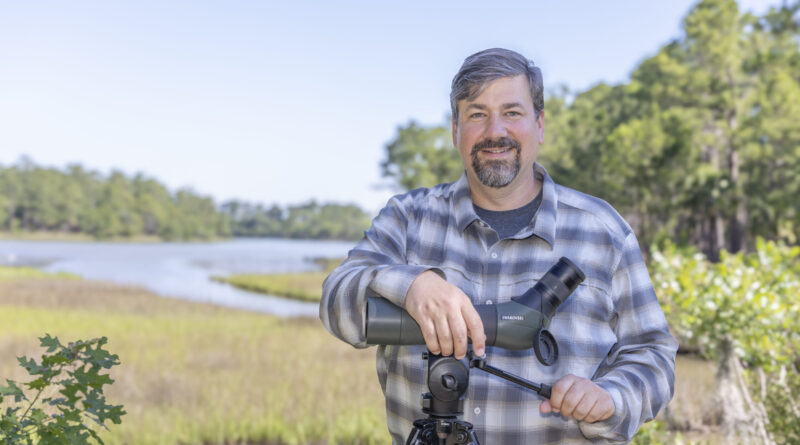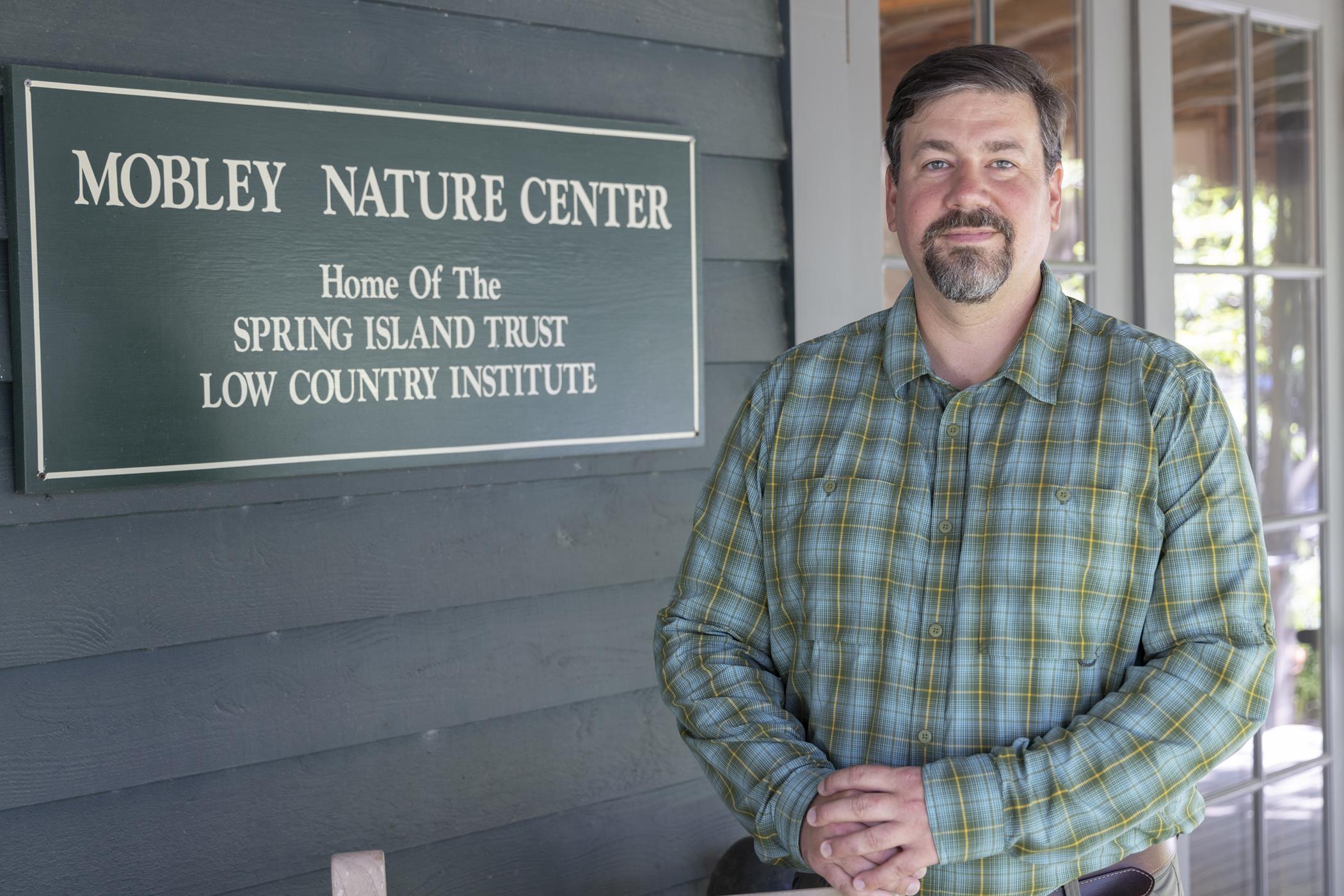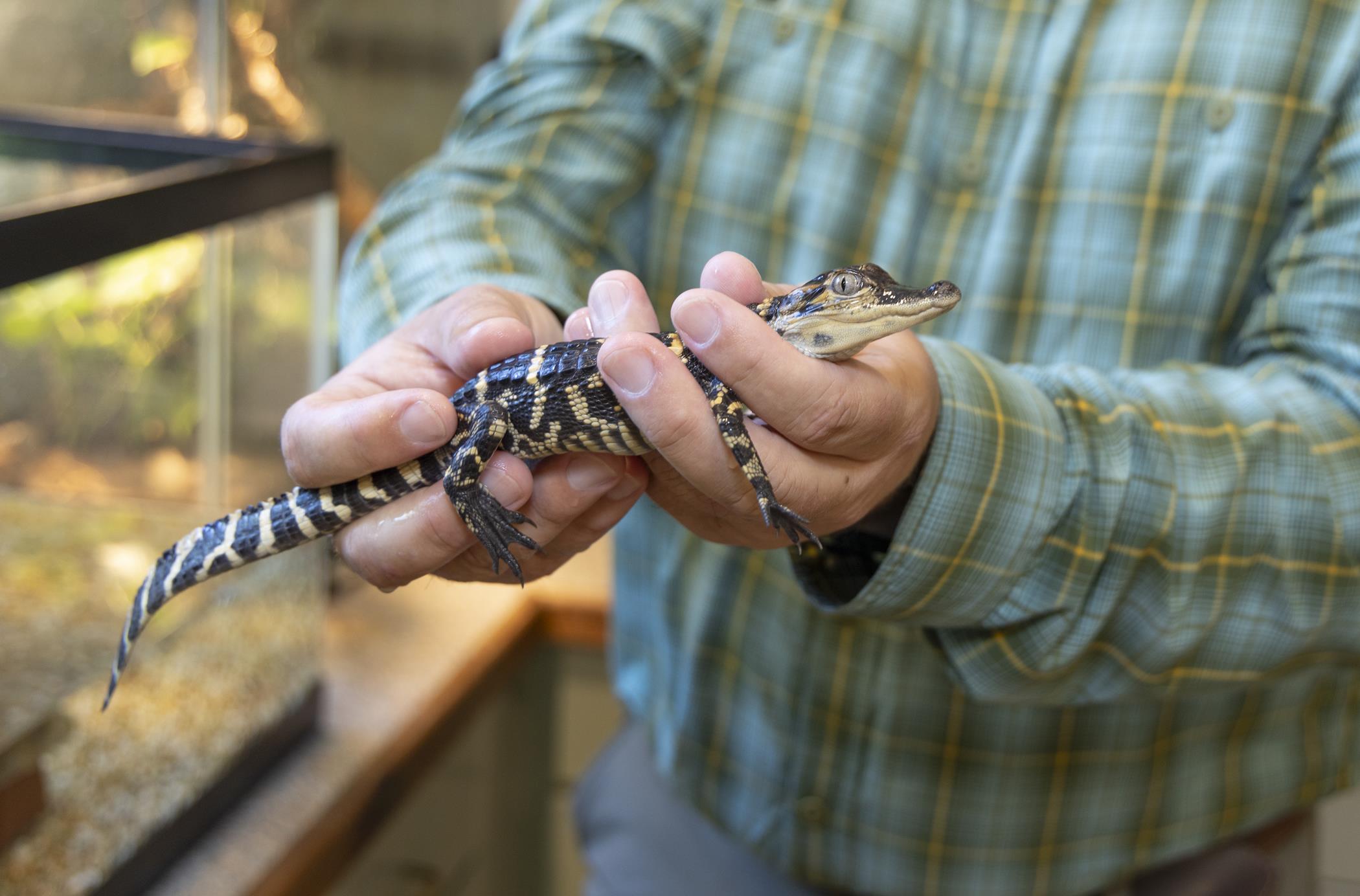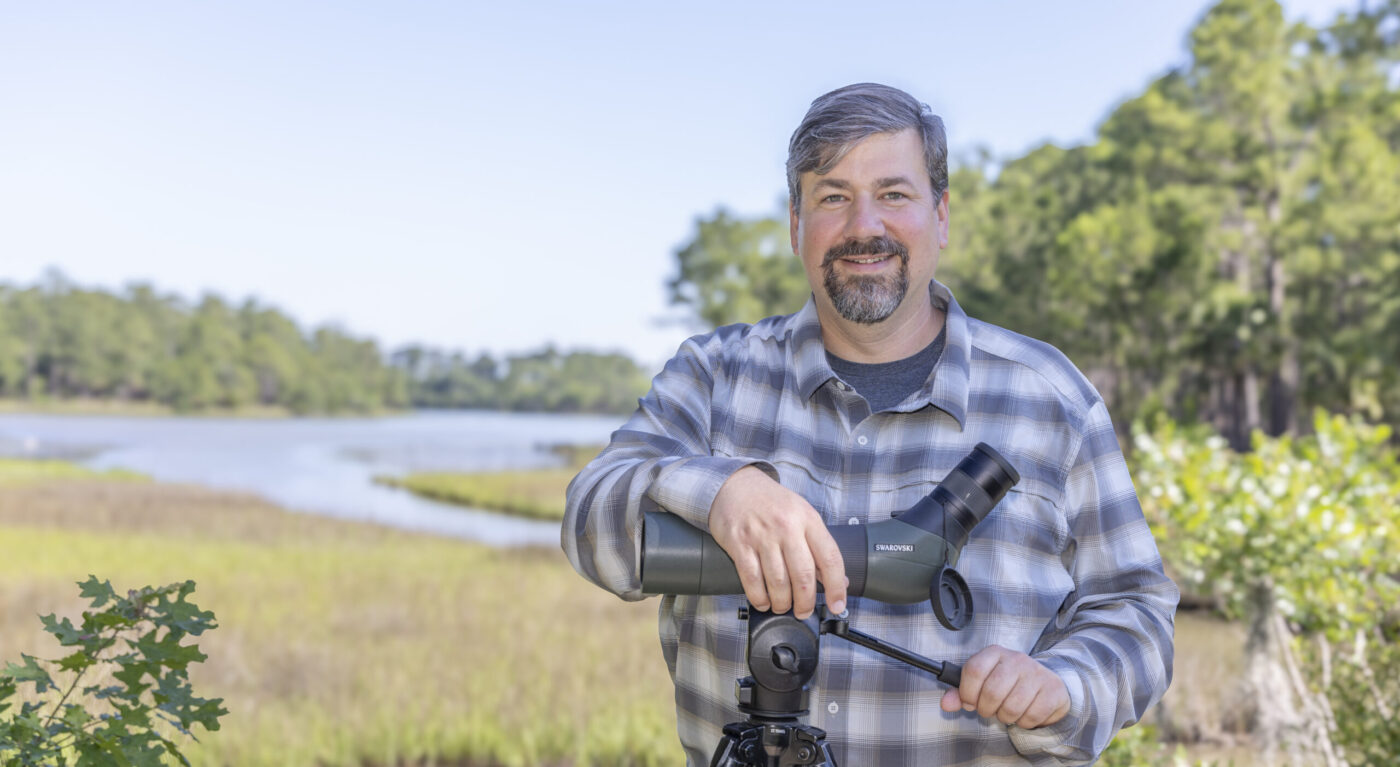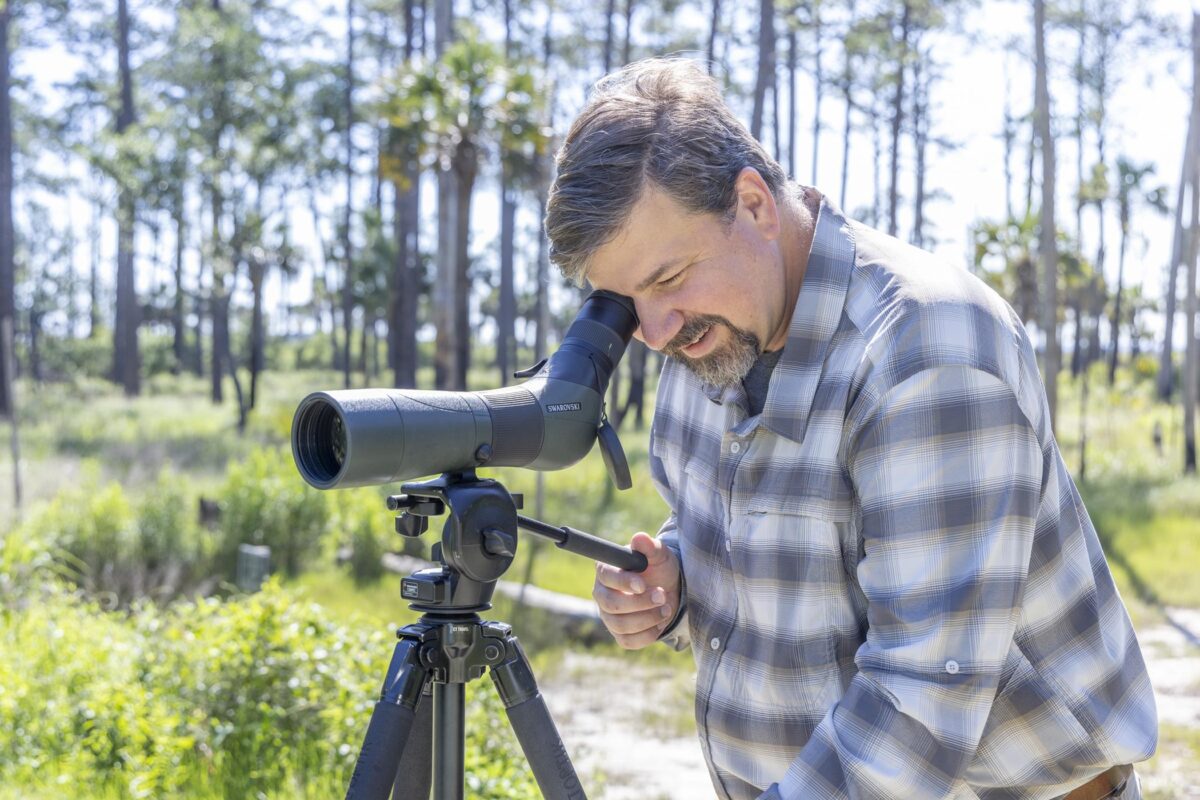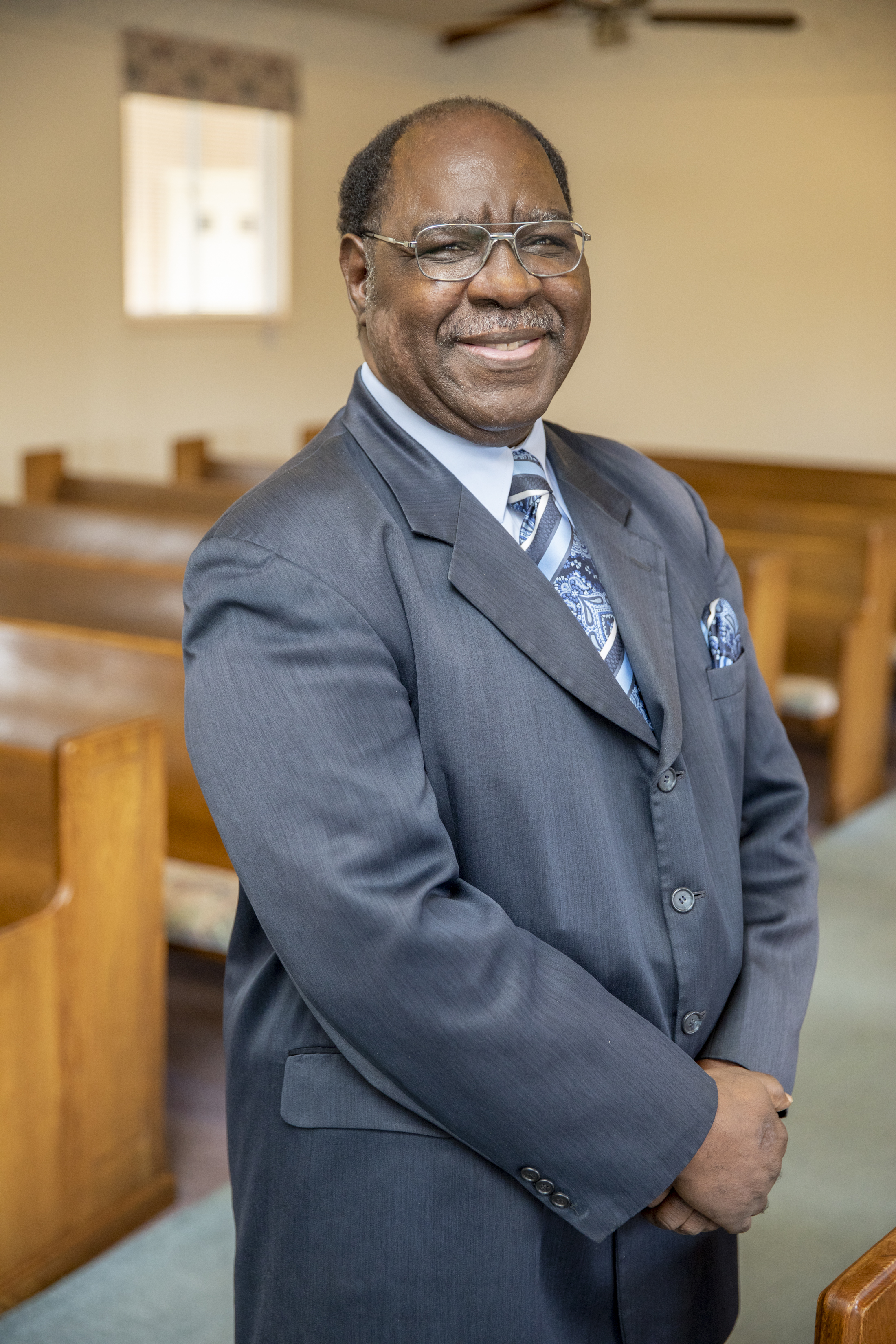Dr. Andy Jones
Hands-On Learning
story by KATE HAMILTON PARDEE photos by PAUL NURNBERG
Executive Director of the Spring Island Trust and Lowcountry Institute
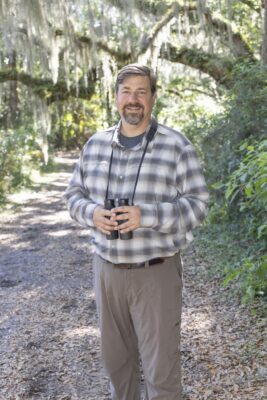 Andy Jones, executive director of the Spring Island Trust and Low Country Institute, was a curious child. He tells me, “Growing up, initially, I loved learning about dinosaurs,” quickly rattling off some of his favorites, the Brontosaurus and the Tyrannosaurus, to name a few. Along with that youthful thirst for knowledge, he developed a passion for nature and a desire to learn about the many bird species he found fascinating. His backyard, located in Raleigh, NC, was a haven for gathering information and creating a lasting kinship with the outdoors and its wildlife. There, he would gaze at and study all the different species of birds and then learn about them from the many field guides his mother, Joan Jones, a librarian, provided him. His father, Wayne Jones, a computer programmer at IBM, supported him, and his young curiosity solidified in high school with a desire to pursue these interests professionally as a career.
Andy Jones, executive director of the Spring Island Trust and Low Country Institute, was a curious child. He tells me, “Growing up, initially, I loved learning about dinosaurs,” quickly rattling off some of his favorites, the Brontosaurus and the Tyrannosaurus, to name a few. Along with that youthful thirst for knowledge, he developed a passion for nature and a desire to learn about the many bird species he found fascinating. His backyard, located in Raleigh, NC, was a haven for gathering information and creating a lasting kinship with the outdoors and its wildlife. There, he would gaze at and study all the different species of birds and then learn about them from the many field guides his mother, Joan Jones, a librarian, provided him. His father, Wayne Jones, a computer programmer at IBM, supported him, and his young curiosity solidified in high school with a desire to pursue these interests professionally as a career.
Jones continued his pursuit, receiving a degree in biology from the University of Tennessee and a PhD in ecology, evolution, and behavior from the University of Minnesota. “I loved all the aspects of these fields in nature, but I knew I wanted to work in field biology,” he shares.
During his college years, Jones worked for two summers as a naturalist at Steele Creek Park in Bristol, Tennessee. He focused on communication with the public and learned “some of the common perceptions and misperceptions people have about wildlife,” he said. He also spent another long, hot summer in the Missouri Ozarks conducting bird counts and mist netting, catching wild birds safely for study in baggy mesh pockets.
After graduating from the University of Tennessee, he received his doctorate in ornithology from the University of Minnesota. Then, Dr. Jones was fortunate to find a job as a Curator of Ornithology at the Cleveland Museum of Natural History in Ohio. “In Cleveland for sixteen years, I took on more administrative responsibilities and was the Director of Science there.” He focused on the taxonomy of terns worldwide and the evolutionary history of boreal bird species. He shares that Cleveland is an excellent birding destination as Lake Erie provides an obstacle to migrating birds, so that they gather in large numbers along the lakeshore. He enjoyed the cultural institutions, great food, and breweries there. “Some wonderful people too,” he adds.
While working with the Cleveland Museum, he participated in the Lights Out Cleveland program in collaboration with several organizations, with crucial leadership by Tim Jasinski, wildlife rehabilitator at the Lake Erie Nature and Science Center. He worked with Jasinki to help study which bird species are injured or killed as they migrate through Cleveland. Birds instinctively look at the stars to guide them, and the illumination from buildings disorients this innate ability. Lights Out Cleveland works with the building owners, encouraging them to turn off lights at night and to treat the most problematic collision sites. Currently, dozens of buildings turn their lights off at night, and one of the significant buildings is modifying its glass to minimize collisions.
During this time in Cleveland, Jones also prioritized travel and his career aspirations by visiting exotic places with incredible wildlife. One of his favorite trips included stops throughout Costa Rica, where he was captivated watching the American Pygmy Kingfisher, toucans, and parrots. But as sixteen years flew by, his roots in the South were calling him home.
“I started looking for jobs and found a post about Spring Island, SC. I didn’t know where it was and wasn’t even sure how to pronounce its town location, Okatie,” replies Jones. He researched the available job position: the Spring Island Trust and Low Country Institute Executive Director. “I also watched one of their promotional videos and then had to watch it again. As a location, it is simply inherently gorgeous.”
It was the Executive Director’s actual role and responsibilities that intrigued him.
This position would involve focusing on and expanding the organization’s outreach, research, and education initiatives. The Trust is a 501(c)3, and its mission is to preserve and protect Spring Island’s environment and cultural history by providing expertise and leadership in conserving natural resources throughout the Lowcountry.
After learning more about the job, a specific aspect hit home to him. “The Low Country Institute focuses on Spring Island as well as the total landscape surrounding it. This position intrigued me, and I knew I didn’t like standing still on one project but concentrating on many that support each other. It could be a perfect fit.”
Jones now has been working for over two years and is very happy. Before moving to South Carolina, he worked on many boards, such as the Winous Point Marsh Conservancy and as the secretary of the American Ornithological Society, where his leadership resulted in recognition as a Fellow of that society. Currently, Jones works in collaboration with nonprofits, such as the Open Land Trust, Port Royal Sound Foundation, Coastal Conservation League, and many more. “We get together for many discussions on issues and enjoy each other socially. In the Lowcountry, preservation is not just about Spring Island. What happens in the marshes of Port Royal Sound affects us all.”
Jones said it is important to note that he came into a job where Dr. Chris Marsh, now director emeritus, created an excellent functioning program with a talented staff that Jones inherited. Jones still speaks to Marsh often. “I was not hired to fix problems but to continue the great mission of the Low Country Institute.” You can see his appreciation and respect for working with Tony Mills, the education director who, according to Jones, “is so knowledgeable and passionate about the nature of the Lowcountry, he makes all aspects fascinating.” In addition, Jones appreciates all the team members he is fortunate to work with at the Spring Island Trust. He does not want to forget that the community of Spring Island is incredibly supportive, which is essential to him. “They respect our work and are pleased with our team’s great conservation and education work that our staff provides.”
Jones is amazed by all the beauty of the natural resources and the gift Port Royal Sound is to the community for so many reasons. Although he feels development can be challenging, “knowing we have so many great teams working on conservation, he feels the future will be in good hands.”
Giving back to the community is one of Jones’s way to serve, including through the Master Naturalist program. In 2000, the Low Country Institute helped Beaufort County Clemson Extension agent Jack Keener initiate the state’s first Master Naturalist program. When Keener retired, the Low Country Institute took it over. He further explains, “This is a twelve-week program that focuses on many elements of nature and is for people who want to go to the next level in learning about ecosystems and wildlife.” It includes field trips and lectures, and Jones enjoys hands-on time with the participants, covering everything from using binoculars correctly for birding to understanding the history of a forest by looking at subtle details.
The program is highly successful, creating a challenge with a waitlist of over 200 people, which may take three or four years for your spot to open to attend. Two sessions are provided each year, and there is a limit of 24 people attending each one. Jones says, “This is a hands-on experience that includes educators who know their stuff. I love seeing the attendees’ commitment and their exciting willingness to learn. It is great to be a part of this and to have the opportunity to see them gain a new understanding of the importance of nature.”
When Jones is not working, he loves spending time at Hunting Island and finds his time there remarkable. “I love to walk the beach, and when friends visit, I take them to the boneyard.” He also loves walking to the North Spit and looking at the shorebirds during the high tides. “It is a two-mile walk from the lighthouse, but the birds are there during the fall and spring bird migrations. There are thousands of birds of many species, and they are traveling from South America to the Arctic parts of Canada to nest.”
So, as Jones continues to get comfortable in the Lowcountry, he remarks, “I love driving into work, crossing the bridges, and observing the incredible views. My trip’s landscape is beautiful, and my commute is almost too amazing to explain.”
He truly appreciates living in the Lowcountry, where his bookshelves in Beaufort are respectfully and thoughtfully lined with the many field guides, including favorites by Roger Tory Peterson, a field observer and artist.
Of course, Jones spends much time in his backyard, where the exploration continues as he enjoys his morning coffee. Here, he observes a bluebird’s nest and watches that family grow. Jones has documented over 100 species of birds using his yard. He is a contented man who feels it is a privilege to share his experience and knowledge, educating people about the beautiful nature in the Lowcountry and the species that reside there. Significantly, his specialty is with birds. It is an incredible life, and Dr. Andy Jones feels fortunate to know that too. But more importantly, we know the Lowcountry is lucky to have him.
To learn more about the Master Naturalist program, email us at Masternaturalist@thelowcountryinstitute.org.

